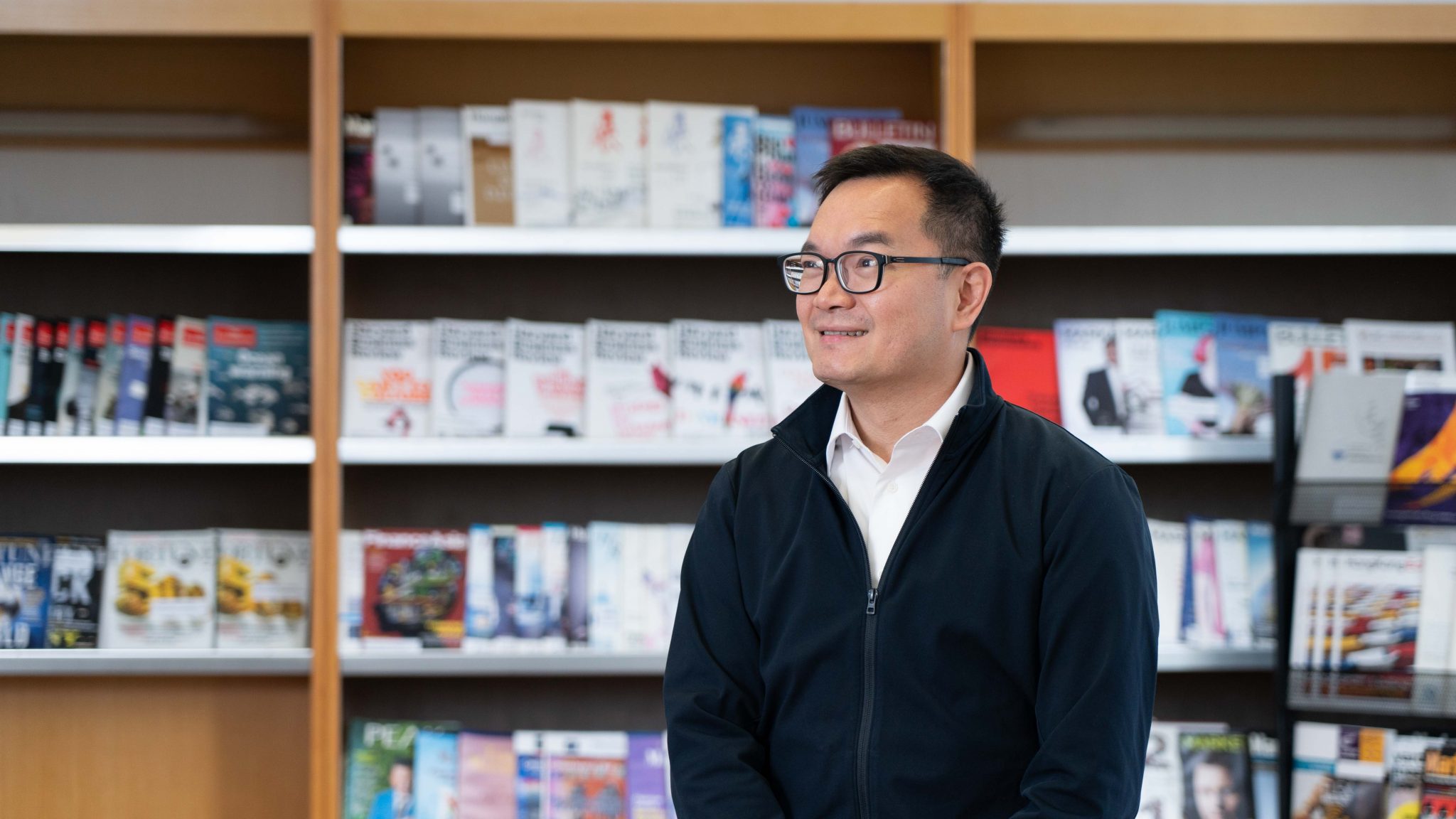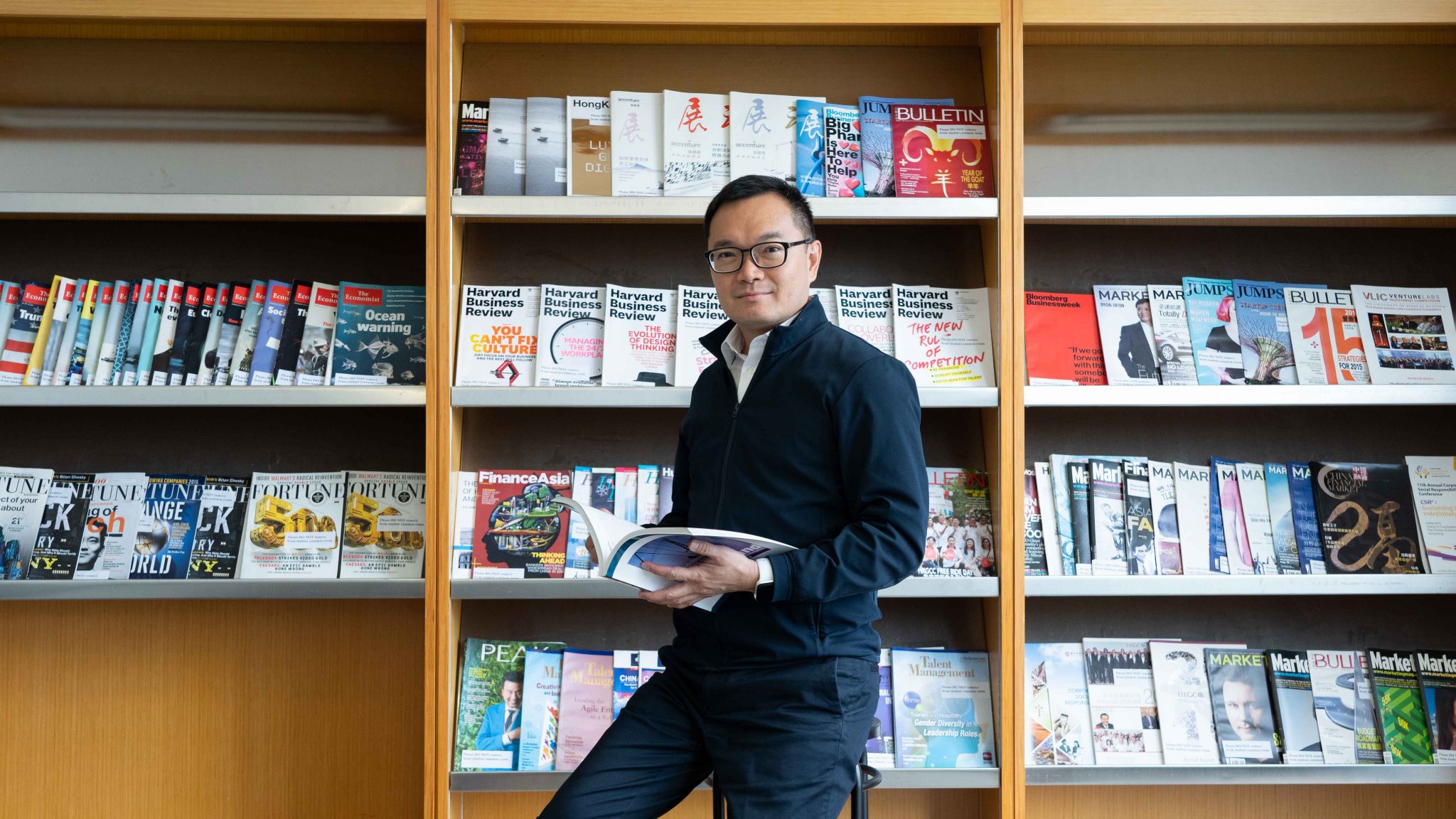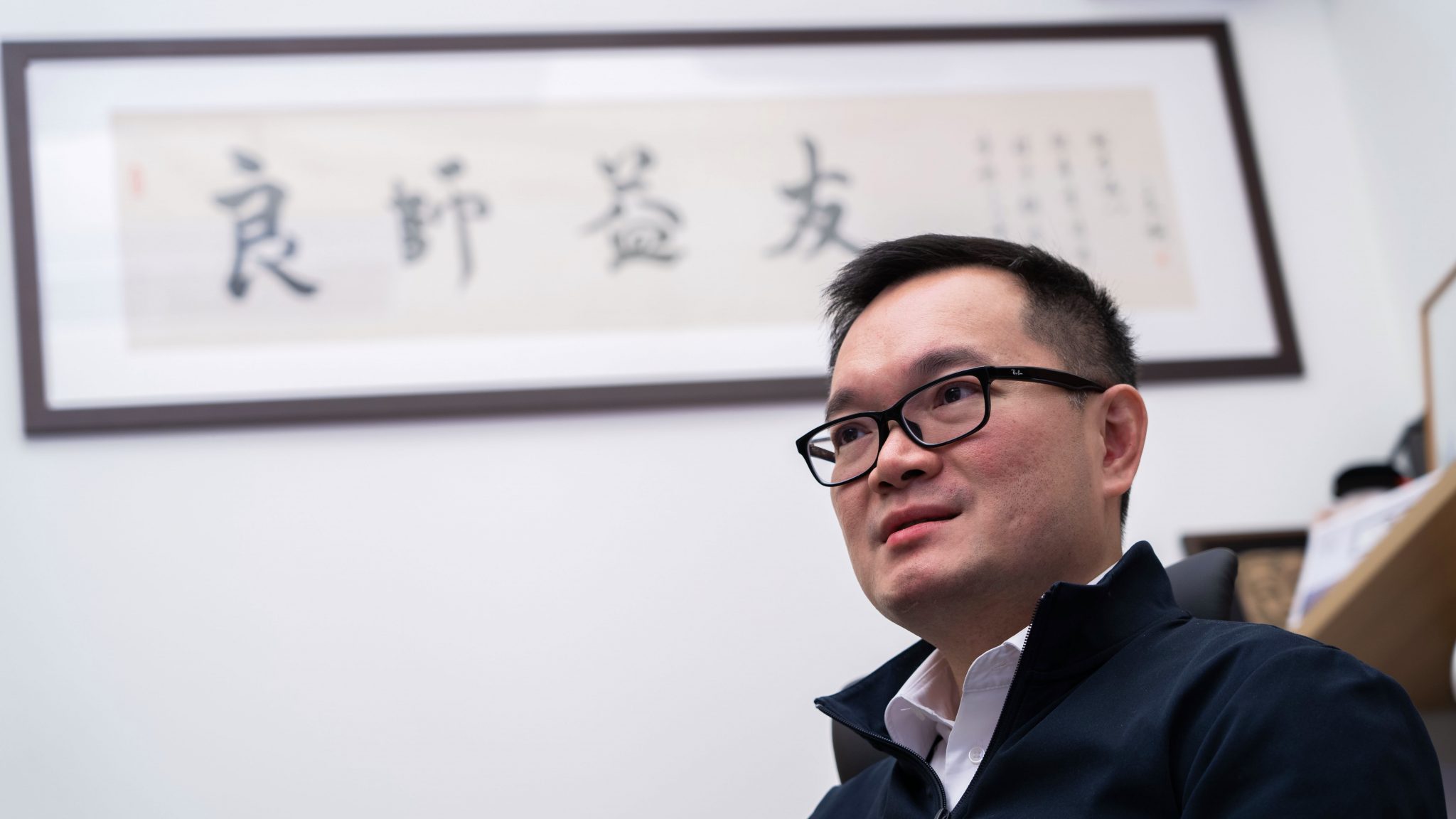The Spark of Joy as a Guiding Light

For a professor who has been teaching at the same place for a dozen years, you would expect him to fall into the same old, same old routine. But not in the case of Dr. John Lai. Whether he is lecturing, directing a programme or conducting research, you’ll always find a spark in his eyes, with an intent on creating excellence in his students and the tasks at hand.
Dr. John Lai, Assistant Dean (Undergraduate Studies), Senior Lecturer of Department of Management and Co-director of MSc in Management (MiM) programme, has been teaching at The Chinese University of Hong Kong (CUHK) Business School for 12 years. Prior to that, he taught at City University of Hong Kong for six years.
While part of his career was spent deep in the trenches – working in human resources and holding various positions in the hospitality, retail and marketing sectors, with experiences throughout Asia – Dr. Lai’s life path never veered far away from his initial dream of becoming an educator. It all started when he was 17.
“I was looking at the ceiling and suddenly I saw a spark. It painted a really clear picture that I wanted to do something meaningful and teaching seems to fit in well and that I should be teaching in a university – but not in Malaysia, where I was born. Since then I have been following this path,” Dr. Lai recalls.
Over the years, Dr. Lai has developed his own personal style of teaching, to the extent that his innovative methodology has earned him numerous accolades. At CUHK, he has received a number of teaching awards, including the University Education Award in 2018, the Vice-Chancellor Exemplary Teaching Award in 2014 and 2010, and the Faculty Outstanding Teaching Award of CUHK Business School from 2015 to 2017.
What is at the core of his teaching style that makes it unique? Dr. Lai attributes his guiding principle to the Chinese philosophy “No distinction of classes”(有教無類).
“Teaching university students is really challenging. At any given time, a professor could be a coach, mentor, teacher, facilitator, magician or technician,” he explains. “Since students come from very diverse backgrounds, there is no one-size-fits-all approach. It is our role as professors to help them understand who they are as unique individuals and unleash their potentials. It’s very important to have patience, because with patience, we are able to inspire them to understand themselves, and be able to make contributions to the society after graduation.”
Teaching university students is really challenging. At any given time, a professor could be a coach, mentor, teacher, facilitator, magician or technician. — Dr. John Lai
He recalls the early days of his teaching career when he thought his job was just about imparting knowledge from textbooks to students. Soon he realised that teaching is not about subjects but people.
“It is important for us to find ways to engage students meaningfully to unleash their potentials. To do that, I emphasise the four C’s – critical thinking, creativity, communication and collaboration.”
To enliven his students in a way that touches them deeply, Dr. Lai regularly uses storytelling as a powerful tool in his classes. He believes that his experiences in international business has helped him demonstrate to students how to link academic knowledge to the real world.
“Storytelling is important. It helps students connect theories with practices. I often illustrate textbook chapters with real-life stories so students can feel how it is if they were in that position. Some of the stories come from my experiences. Sharing them is not about showing off how great I am, but showing them how not to make the same mistakes as I did!”
Besides storytelling, Dr. Lai also adopts an experiential approach in his teaching. He takes students out of the campus and encourages them to participate in case competitions. “Xunzi(荀子)once said: ‘I hear and I forget. I see and I remember. I do and I understand.*’ So I try to incorporate this approach into the classroom to bring students to the world and bring the world to CUHK.”
When there is involvement, there is commitment; when there is commitment, there’s going to be action.” — Dr. John Lai
The third element in Dr. Lai’s teaching approach is networking. “The student body is so diverse. Typically, there are 70 students in the classroom. It’s a pity to see them just sit there before class, looking at their iPhones and iPads. So, I would ask students to rotate seats every week and get to know each other, not superficially but personally. When I assign projects, I encourage students to make sure there is a good mix of students from Hong Kong, Mainland China and overseas in each group. My own connection with students is also important for me to understand them. After all, it’s not only about teaching, it’s about helping students realise their potentials.”
One way Dr. Lai connects with students is through WhatsApp groups. When he served as the Director of Global Business Studies (GBS) and International Business and Chinese Enterprise (IBCE) programmes for five years, he reached out to each cohort of students through a separate WhatsApp group. “The list is exhaustive. But I do have fun. This makes work exciting,” he says with a grin.
While leading those two programmes that attracted elite students, he tried to involve and engage them in relevant events, workshops and study trips. “When there is involvement, there is commitment; when there is commitment, there’s going to be action,” he says.
Speaking of commitment, Dr. Lai’s commitment to CUHK Business School has been a testimony of sheer dedication. While he was the Director of the two global business programmes, he simultaneously served as an Assistant Dean for Undergraduate Studies. How did he manage to juggle teaching, administrative work and research at the same time?
At first, he was doubtful of his own ability to do so. But he recalls being encouraged by Shige Makino, Professor of Department of Management and Co-director of MiM programme at CUHK Business School, when he was offered the positions by former Associate Dean Prof. Dennis Fan. “At that time, Prof. Makino said, ‘John, you’ve been teaching for so long, now it’s time to make a difference – not just in teaching, but in the programmes.’ I took that advice and jumped at the opportunity. Of course, balancing teaching, administration and research is a tough juggling act. So I asked Prof. Makino what the secret was. He looked me in the eyes and said, ‘Sacrifice!'”
It makes my day when students still remember us after they have graduated for many years; when they still come back and stay connected with us by sharing a simple meal, coffee or tea, telling us how they are doing to the society. — Dr. John Lai
This is not empty sacrifice though, emphasises Dr. Lai. “At the end of the day, if we understand that whatever humble contributions we’re making will help students in the learning process, it will make all the difference. If you love what you do, vocation is vacation.”
Currently, Dr. Lai is Co-director of the recently launched MiM programme, which allows students to move directly to the executive management track without having to wait three years and work in business before applying for an MBA. The programme’s mission is to fulfill society’s need for business leaders who are generalists and at the same time, catalysts of change. It also aims to help shape the digital economy of Asia – to develop “global managers for the Asian century.”
“We want to ensure that the MiM programme is a practice-oriented learning programme,” Dr. Lai remarks. During the semester, there will be continuous engagements with industry leaders. So far, there has been more than nine events involving industry leaders. In the coming months, the MiM Forum will be introduced. At the end of the programme, a capstone programme will bring students out of Hong Kong and immerse them in real-life consultancy projects.
Besides teaching and directing programmes, research is the third of the three-legged stool Dr. Lai has been sitting on at the Business School. His research focus on business innovations and networks. “I try to do credible research along the way,” he says. “My inspiration comes from my supervisor, Prof. Steven Lui (Associate Professor of School of Management at UNSW Business School of the University of New South Wales) at my alma mater, the University of New South Wales. I believe that one way to stand out in research is to work closely with industry partners. We don’t want to create research just for the sake of being published in journals. Instead, we want to contribute to the success of organisations.”
One of Dr. Lai’s most memorable projects was a research project for a Hong Kong retail chain. Over a six-month period, he visited 175 stores in Hong Kong, Macau, Shenzhen, Guangzhou, Shanghai and Beijing. “It was a great experience for me, because when I went to the outlets, I was able to observe and learn along the way,” he says. “This opened up my heart, mind and soul, and I was able to bring the research back to my teaching.”
Our job doesn’t stop after students have completed the course or graduated from university. My fellow faculty members and I share the same belief that our role only begins when students have graduated, come back and shared their stories. — Dr. John Lai
When asked about the most memorable event in his teaching life, Dr. Lai didn’t give a single incident but summed it up, “It makes my day when students still remember us the ‘Old Biscuits’ (a Cantonese slang meaning old-timers) after they have graduated for many years; when they still stay connected with us by sharing a simple meal, coffee or tea, telling us how they are doing to the society. That’s what makes teaching so special to me.”
In fact, one of Dr. Lai’s strongest convictions about teaching is that it is a “life-long warrantee”.
“Our job doesn’t stop after our students have completed the course or graduated from university. My fellow faculty members and I share the same belief that our role only begins when students have graduated, come back and shared their stories. That’s a proof that they have put into practice what they have learned. And when they share stories with me, I can share them with the current students,” says Dr. Lai, with an even stronger spark in his eyes.
It is clear how his life is driven by passion. What he finds most interesting about his work is that every day is different. “I try to look for what Marie Kondo(近藤麻理惠)calls ‘the spark of joy’ in work, so that my excitement can be perpetuated . And that, my daily work as a faculty member will not become routine.”
 *Source: “不聞不若聞之,聞之不若見之,見之不若知之,知之不若行之,學至於行之而止矣。” – Xunzi’s “Confucian Effect” Chapter(儒效篇)
*Source: “不聞不若聞之,聞之不若見之,見之不若知之,知之不若行之,學至於行之而止矣。” – Xunzi’s “Confucian Effect” Chapter(儒效篇)


